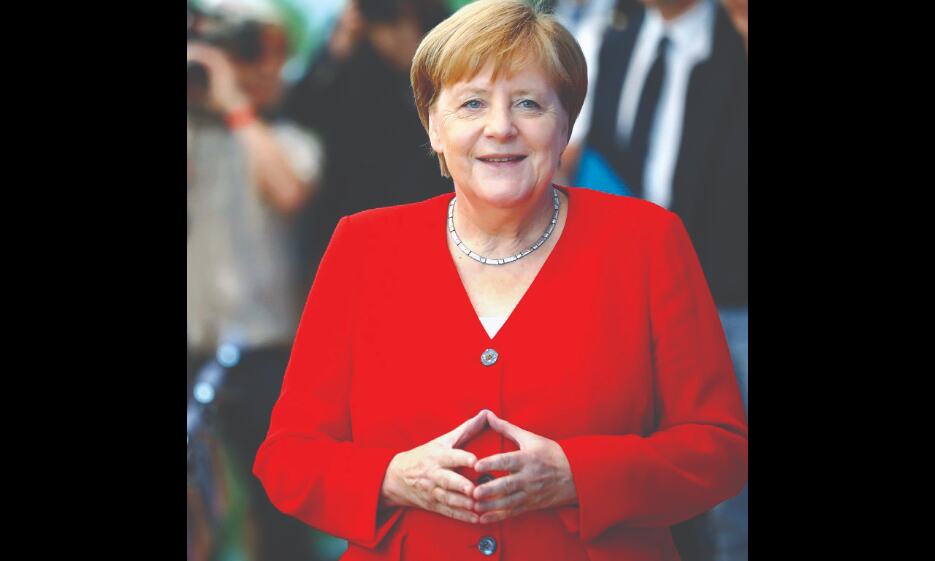End of an era: Germany's Merkel bows out after 16 yrs

Berlin: Angela Merkel was assured of a place in the history books as soon as she became Germany's first female chancellor on Nov 22, 2005.
Over the next 16 years, she was credited with raising Germany's profile and influence, working to hold a fractious European Union together, managing a string of crises and being a role model for women.
Now that near-record tenure is ending with her leaving office at age 67 to praise from abroad and enduring popularity at home. Her designated successor, Olaf Scholz, is expected to take office Wednesday.
Merkel, a former scientist who grew up in communist East Germany, is bowing out about a week short of the record for longevity held by her one-time mentor, Helmut Kohl, who reunited Germany during his 1982-1998 tenure.
While Merkel perhaps lacks a spectacular signature achievement, the center-right Christian Democrat came to be viewed as an indispensable crisis manager and defender of Western values in turbulent times.
She served alongside four US presidents, four French presidents, five British prime ministers and eight Italian premiers. Her chancellorship was marked by four major challenges: the global financial crisis, Europe's debt crisis, the 2015-16 influx of refugees to Europe and the Coronavirus pandemic.
It's undeniable that she's given Germany a lot of soft power," said Sudha David-Wilp, the deputy director of the German Marshall Fund of the United States' Berlin office. Undoubtedly she's elevated Germany's image in the world.
When she first came onto the scene in 2005, a lot of people underestimated her, but she grew in stature along with Germany's role in the world," David-Wilp added. Others in Europe and beyond want more of an active Germany to play a role in the world that may not have been the case before she was in office, necessarily.
In a video message at Merkel's final EU summit in October, former US President Barack Obama thanked her for taking the high ground for so many years. Thanks to you, the center has held through many storms, he said.
Merkel was a driving force behind EU sanctions against Russia over its annexation of Crimea and backing of separatists in eastern Ukraine, and also spearheaded so-far-unfinished efforts to bring about a diplomatic solution there. She was regarded as being able to have a dialogue with (Russian President Vladimir) Putin on behalf of the West , David-Wilp said.
She was steadfast in pursuing multilateral solutions to the world's problems, a principle she set out at a military parade in her honor last week.
The global financial crisis and the migrant influx made clear how much we depend on cooperation beyond national borders and how indispensable international institutions and multilateral instruments are to be able to cope with the big challenges of our time, Merkel said, identifying those as climate change, digitization and migration.
That stance was a strong counterpoint to former US President Donald Trump, with whom she had a difficult relationship. At their first meeting in the White House in March 2017, when photographers shouted for them to shake hands, she quietly asked Trump do you want to have a handshake? but there was no response from the president, who looked ahead.
Merkel dismissed being labeled as leader of the free world" during that period, saying leadership is never up to one person or country.
Still, she was viewed as a crucial leader in the unwieldy 27-nation EU, famed for her stamina in coaxing agreements in marathon negotiating sessions.
Ms Merkel was a compromise machine, Luxembourg Prime Minister Xavier Bettel said recently. When negotiations were blocked, she mostly found something that unites us to move things along.
That was on display in July 2020, when EU leaders clinched a deal on an unprecedented 1.8 trillion-euro ( 2 trillion) budget and Coronavirus recovery fund after a quarrelsome four-day summit.
At her 107th and last EU summit, European Council President Charles Michel told Merkel: You are a monument. A summit without her would be like Rome without the Vatican or Paris without the Eiffel Tower, he added.
The appreciation from her counterparts was genuine, although there was plenty of friction over the years. Merkel always sought to keep the EU as tightly knit as possible but strongly defended Germany's interests, clashing with Greece during the debt crisis and disagreeing with Hungary, Poland and others over their refusal unlike Germany to host migrants arriving in Europe.
Merkel said she was bowing out of the EU in a situation that definitely gives me cause for concern as well. We have been able to overcome many crises in a spirit of respect, in an effort always to find common solutions she said.
But we also have a series of unresolved problems, and there are big unfinished tasks for my successor.



